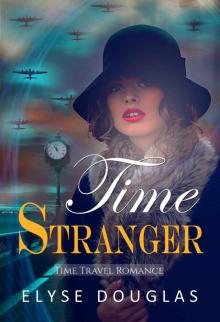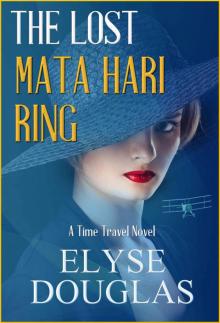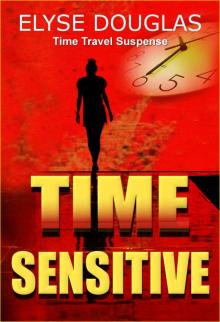- Home
- Elyse Douglas
The Lost Mata Hari Ring Page 7
The Lost Mata Hari Ring Read online
Page 7
Trace sank in height. “Chantilly? In France?”
“Yes, in France.”
Edward tilted his head slightly, looking for a joke. Instead, he saw she was troubled.
“Yes, Trace. You are in France, about 40 minutes from Paris. Where did you think you were?”
Trace nodded, dazed and resigned. “What month and year is it?”
Edward stood a bit taller, concerned now. “Are you quite all right, Trace?”
“No, I’m not. I am not quite all right at all,” she said, more forcefully than she meant to. “What are the month and date, Edward?”
He was serious now. “It’s Saturday, June 28, 1916.”
Trace’s eyes went vacant, her body wilted. She slowly shut the door, turned, and leaned back against it, unable to move. She was at the end of all thought.
CHAPTER 9
Trace awoke in a wide, four-poster bed covered by wine-colored velvet fabrics, each with fine, crystal studded detailing. She felt like a queen, awakening in a world of castles, class and powdered wigs.
Outside the open windows, she heard birdsong and distant voices. She heard a hum of mumbled words, and then a break into laughter. She raised up, instantly awake, searching the room, sure she’d been dreaming—praying it had all been imagined: Mata Hari, Edward and a chateau near Paris.
She examined the place, seeing a stunning antique Louis XVI style paneled room, gilded with silver leaves; furniture of red velvet chairs, a cream color settee, a towering, delicately carved armoire, gilded mirrors and mantle clocks, and a four-foot marble statue of Apollo in all his muscled glory near a white marble fireplace.
The wood floors gleamed, partially covered by an extravagant royal blue and gold fringed carpet that must have been over 100 years old. The smooth walls contained 18th-century landscapes and portraits of elegant royal ladies, dressed in flowing silk dresses, showing off jewels that shimmered, shouting out wealth and privilege.
This was no dream. She had not imagined it. She was stuck in the glue of another world, and she sank back down into the bed, willing herself to fly away.
The voices outside persisted, and her curiosity took over. Sun streamed in from the partially opened yellow silk draperies, and a gentle wind blew in, fluttering them.
She threw back the red, wine-colored satin sheet, swung her feet to the floor and pushed up. Still a little unsteady on her feet, she meandered toward the window and squinted out.
Below, on a pink stone patio, she saw Edward, Mata Hari and another man, who was dressed in a dark uniform, all seated around a table, sipping wine, with a silver tray of cheese and fruit before them. Was the other man Captain Vladimir de Masloff, the officer in the Russian Army, and Mata Hari’s 21-year-old lover? But he looked so young—just a boy.
She drew back from the window and eased down to sit cross-legged on the cool wooden floor. She closed her eyes, and for a long time she just breathed in and out, until her spinning mind became controlled and still. Learning to survive in this time would be paramount, until she could learn why she was here and how she could return.
As absurd and insane as it was, she had to consider the fact that when she looked at Mata Hari, Trace was actually looking at herself as she once was—Mata Hari in 1916.
A searing thought struck, one she knew occurred to all time travelers. If she had time traveled to the past, would she, by her choices and actions, alter the future? Her future and the world’s future?
During her life as Trace, she’d struggled nearly every day with nightmares and pain. She had been close to losing her mind. Could this journey to the past be a kind of saving grace? Could she plot to change what had happened to herself in the past as Mata Hari, and thus save herself in the future?
Maybe she could influence and encourage this Mata Hari to make better choices and thus prevent the mess she’d made of her life. Maybe Mata Hari could reconcile with her daughter, Nonnie, and have a meaningful and loving marriage with Vadime, and escape her awful death.
Then what was she, Trace? A kind of living, breathing ghost, haunting this world of 1916, searching for redemption for what she’d done in the past?
Outside, she heard more laughter. She was startled when she heard Edward speak her name. She raised to the window and, hiding behind the draperies, she drew them back and peered down.
Mata Hari held a wine glass poised at her lips. Vadime was smoking a cigarette and Edward held a pipe, staring off toward a sprouting fountain, water glistening in the sunlight.
“I think something rather traumatic has happened to Trace,” Edward said.
“She has such a strange, far-away look in her eyes,” Mata Hari said. “Frankly, it unnerved me to look into them. Will you be taking her back with you tonight, Edward?”
“I can’t wait to meet this Trace,” Vadime said, in a thick Russian accent.
Edward continued. “I’ve been thinking that perhaps she has a kind of memory loss. She seems kind of distant and dazed. I know a doctor in Paris I can take her to. I’ve seen soldiers from the front who have lost their memories. They call it shell shock. They don’t know who they are or where they come from.”
“Well you should know what’s the matter with her, Edward,” Mata Hari said. “You brought her.”
Edward cleared his throat, as if he’d lost himself in reverie, forgetting he had vouched for her, pretending he knew her. “Well, yes, of course I did, Mata Hari, but something has changed in her since she’s been here. She doesn’t seem to recall certain things.”
“Maybe it’s the way you make love to her,” Vadime said, with a chuckle. “Be more gentle, man. You’re too passionate with the girl.”
Mata Hari and Vadime laughed. Edward did not.
“You never did tell me where you met her,” Mata Hari asked. “She told me she didn’t recall, and I don’t think that is so flattering for you, Edward, when a girl can’t recall where she has met a handsome British flyer war ace.”
There was a brief silence. “We met in Paris,” Edward said, so softly that Trace just barely heard him.
“Paris is a big city, Edward. Where in Paris?” Vadime asked.
He stuttered. “Oh, well… you know at the Boulangerie Patisserie in Montmartre. She was with some friends.”
“And, of course, you fell in love with her right off, didn’t you, Captain Bishop?” Vadime said.
“Yes, Captain Masloff, my friend. At first sight, I indeed did fall in love with her. And I can tell you, without any doubt, that it is a love you feel just one time in a lifetime. It’s an odd kind of feeling, and I’m not sure I can quite put it into words.”
“Why Edward, I have never known you to be so romantic,” Mata Hari said. “Otherwise, I might have seduced you.”
“You tried, Mata Hari. Don’t you remember?” Vadime said, with a laugh, “but my dear friend, Captain Bishop, is engaged to a very proper English girl, and he turned you down.”
“How rude of you to remember, Vadime. I was merely teasing Edward. So, have you told your British fiancée about this Trace Rutland, Edward, and your sudden gushing love for her?”
Trace backed away from the curtain, feeling hot outside and cold inside.
“Some things a gentleman doesn’t discuss. Anyway, as you know, Mata Hari, we pilots are living on borrowed time, and so life becomes more heightened and much more precious to us. We must take love where we can find it. Isn’t that right, Captain Vadime?”
“I’m afraid so, my dear friend.”
“Mata Hari, did Captain Masloff tell you that we are about to embark on a new offensive? This is all hush-hush, of course, but there are no Germans around, are there?”
“Don’t speak of such things, Edward,” Mata Hari said in a scolding voice. “I detest unpleasant things, and I especially detest this war. It has taken all the joy out of Paris.”
“Nonetheless, my sweet,” Vadime said, “Captain Bishop is right. We flyers are like puffs of smoke in this war. So many of our comrades have perished, and the
y continue to perish every day in the skies above France.”
“Let’s stop all this depressing talk. I’ll have no more of it,” Mata Hari said, jutting out her jaw. “From now on, we talk only of pleasure, good times and making love. That is all. Meanwhile, Edward, go check on your lovely girl. You must wake her up and prepare her for dinner. There is so much I want to ask her.”
“And I must see this girl who has captured your heart so quickly, Captain Bishop.”
Trace heard Edward’s chair push back, scraping across the stones. She backed away from the window. He was on his way. What now? She had no clothes, no makeup, no money. What in the world was she going to do? She stood like a deer in headlights.
When the inevitable knock came, Trace was in the marble bathroom, staring at a gilded porcelain clawfoot tub, with gold fixtures and a rack of snow-white fluffy towels. After a bath, what would she put on?
The knock on the bedroom door was persistent. She left the bathroom and stood in the middle of the floor with her hands on her hips, hoping for a confident look.
“Is that you, Edward?”
“Yes, Trace. Are you up?”
“Yes…”
“May I come in?”
She had a thought. “Just a minute.”
Trace swiftly buttoned the top two buttons on her pajamas and reached for her robe. After she’d belted it with a tight tug, and finger combed her hair, she took some deep breaths and returned to her previous confident pose.
“Come in, Edward.”
The door opened slowly and when Edward appeared, she felt a little tremor of desire. He was coatless, his white shirt rolled up at the elbows, revealing strong forearms and a wide chest. But it was his lips that captured and held her for a short hypnotic moment. They were full and sensuous, and his mouth slightly parted as if waiting for her kiss. The man was certainly appealing, but she quickly brushed the thought aside. She had no time for anything even slightly romantic.
“How are you feeling, Trace?”
“Much better, thank you. I was just going to take a bath, if that’s all right. Do you need to use the room for anything?”
He didn’t seem to hear her question. He just stared. “You are such a beautiful woman, Trace,” he said, smiling into her eyes. “You are telling the truth, aren’t you? I mean to say, that you are not married?”
It was a simple question, but a direct one. For some reason, it unsettled and thrilled her. Edward oozed charm and class—an old-world gentlemanly approach and polish that, against her will, unwrapped her defenses and relaxed her.
“No, I’m not married. Are you?” she said, staring with a challenge into those bottomless gray/green, glittering eyes of his.
He looked toward the windows, with a slight frown. “Shall I tell you the truth, Trace, and risk losing you?”
“Do you have me?” Trace said, knowing how it sounded, bold and flirtatious.
He met her direct gaze, and he squared his shoulders. “I’m engaged to a girl back home in England.”
“And does this girl back home have a name?”
His expression pained. “At the moment, does it matter?”
“To me it does. Yes.”
He gave her a quick nod. “All right then. Her name is Elizabeth Ashley Pemberton.”
“Well now, that’s a very long name, isn’t it? A classy name. Must be rich. I bet you’re rich, aren’t you, Edward?”
That amused him, and he shut the door behind him, not taking his eyes from her as he did so. Trace liked the sudden intimacy, and the flirtatious play. It was refreshingly distracting, and she needed as much distraction as she could get.
Edward cleared his throat. “Bishop Manor is a stately home in North Yorkshire, England. The first Bishop Manor was built in 1756 for the 3rd Earl of Carlisle, a relative. Yes, Trace, I come from a wealthy family. My father is a member of Parliament. My mother is descended from royalty.”
“And I bet Ms. Pemberton descends, or shall I say ascends? Yes, ascends sounds so much better, I think. Does Miss Elizabeth Ashley Pemberton ascend from royalty as well?”
He waggled a finger at her. “You are making fun of me, Trace.”
She grinned. “Yes, I am. Is Miss Pemberton from a wealthy family?”
“Her family had wealth. Actually, at present, she has more title than wealth.”
“But you love her?”
He gave her a sharp, cunning gaze. “You keep toying with me, Miss Rutland.”
“…Yes, Edward, I am, and I must have irritated you because you just called me Miss Rutland.”
“I’m not at all irritated with you. Intrigued by you, yes. Infatuated? Definitely. Completely undone by you? Oh, yes. Now that I have told you about me, what can you tell me about you,” Edward said, slipping his hands into his pants pockets and rocking on his heels.
Trace considered the question with care. “If I recall my family tree, John Rutland came from Lincolnshire, England in 1763, and settled in North Carolina. Two of my distant descendants fought in the Revolutionary War to rid the colonies of the bloody British and help establish the United States of America. So, it seems, Captain Bishop, that your family and my family were once enemies.”
Edward smiled. “It is so good of you to point out the obvious, Miss Rutland.”
“Are you being sarcastic, Edward?”
“Yes, I am. So where were you born?”
“Lexington, Kentucky.”
He brightened. “Ah, yes, Kentucky. I know about Kentucky. My family has a stable of horses, and one of our trainers, a rather curious chap with a very curious accent, is from Kentucky.”
“Was his accent like mine?”
“Not as charming, I can assure you, Miss Rutland, Trace. And how and why did you come to France and, more importantly, how did you end up here with Mata Hari?”
Trace dropped her gaze. “I can’t tell you that right now, Edward. Maybe later. In the meantime, I’m going to level with you.”
“Level with me? What a curious thing to say. Is that an American expression?”
“Yes. Edward, it is American. Okay, so I have no clothes, no money and nowhere to go. Can you help me?”
A slow, pleasurable smile creased Edward’s lips. “Miss Rutland, you are the most bewitching, attractive and fascinating woman I have ever met. Rest assured that you can place yourself entirely in my care for as long as you may wish. And I hope that it will be for a very long time.”
CHAPTER 10
At dinner, Trace wore one of Mata Hari’s extravagantly designed dresses, a full length, red wine Edwardian style dress, with silky chiffon and cappuccino satin. It was finished with silver embroidery, silver beading and handmade flowers and lace.
Mata Hari had stopped by Trace’s room to present it to her, with smiling pride and probing curiosity.
“I had it made in Paris, in 1905. It should fit you well. I have gained some pounds since then. Vadime says he finds the pounds sexy, but I find that I can no longer fit in these old gowns that hold such fond memories for me. So goes life. I think it will look lovely on you.”
After Mata Hari left, Trace carefully slipped into the dress, touching the silver beading and satin, awed by the feel and style. For a second, she had a flashback—recalling wearing the same dress to a dinner party in Paris, in her past life as Mata Hari. Suddenly dizzy, Trace dropped to the couch with a bounce to catch her breath, and to shake off the memory.
Later, Trace slipped on the matching gloves and turned stiffly to face the mirror, nervously surprised. It was a regal and elegant dress and it fit her well, taut in the waist, clinging gently to her hips. She had never worn such a richly designed and textured gown in any Broadway show. It was truly an original.
When Edward returned from a walk, entered the room and saw her standing before him in the soft light, he breathed her in and sighed with pleasure. His eyes lingered on her, the red berry lips, the curly voluminous hairstyle, the regal posture. A small smile formed at the corners of his mouth.
“Miss Rutland, you look as though you just have stepped out of a dream.”
Trace wanted to say You have no idea, but she didn’t.
At dinner, Edward sat across the table from Trace, and as he spooned his soup, his lively eyes stole flirtatious glances toward her. Mata Hari had also lent Trace a French enamel pearl and gold locket pendant with a gold chain, a gift from the Marquis de Beaufort, or so Trace had been told. He’d been a lover when Mata Hari had danced in Paris in 1907.
Mata Hari wore a long bobbin lace gown that helped hide some of the tummy weight, while accenting her hips and modestly covering her breasts. Her makeup was light, but her lips were very red, and her dark intelligent eyes took in everything, missing nothing, including Edward’s obvious attraction to Trace. But Mata Hari was cautiously watchful and, at times, her dark eyes seemed to bore a hole through Trace, as if she were struggling to crack the mystery of her.
Edward and Vadime wore their military uniforms, Edward looking especially lean, muscular and striking in his green gabardine jacket with leather brown shoulder straps, broad belt, and royal flying corps khaki wings badge. In the light, the luster of his eyes was a greenish gold, his chestnut hair combed back from his forehead, his bearing regal and straight. To Trace, this man was a definite “turn on.” A masculine fantasy come true; the type of man that did not exist in her time, but a man she’d dreamed of in the deepest and most secret core of her heart. She tried to swat away her attraction to Edward, but whenever she was with him, there was a familiar tug at her heart, as if she’d known him before. She felt an opening of emotion, a letting in of desire and hope.
And yet, as she sat there at the dinner table, she also felt as though she had stepped onto a movie set, and she didn’t know the plot, the character or her lines. She seemed to be wavering in and out of a reality that was both enthralling and frightening.
During dinner, the conversation wandered and rambled, but the men always brought it back to the war and to flying.

 The Christmas Women
The Christmas Women Time Stranger
Time Stranger The Lost Mata Hari Ring
The Lost Mata Hari Ring Time Sensitive
Time Sensitive The Christmas Eve Daughter - A Time Travel Novel: The Sequel to The Christmas Eve Letter
The Christmas Eve Daughter - A Time Travel Novel: The Sequel to The Christmas Eve Letter The Date Before Christmas: A Novel
The Date Before Christmas: A Novel